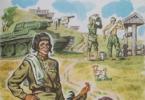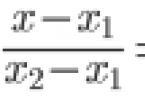Hercules is the founder of the Olympic Games. - Busiris. - The myth of the pygmies. - Hercules and Antaeus. - Pillars of Hercules. - Giant Cacus. - Hercules and Omphale. - Kerkopy. - Hercules in Troy. - Aheloy. - Dejanira and the centaur Nessus. - Bonfire on Mount Ete and the apotheosis of Hercules. - Type of Hercules in art.
Hercules - founder of the Olympic Games
In addition to the twelve labors performed by Hercules on the orders of Eurystheus, the myths of ancient Greece ascribe many other labors to the hero, which seem to complement the characteristics of Hercules, this tamer and destroyer of monsters, a champion of truth and justice.
Having cleared the Augean stables and deprived this treacherous king of his kingdom, Hercules established the Olympic Games there and erected twelve altars to the twelve gods of Olympus.
BUSIRIS
Pharaoh was killed by Hercules in Egypt Busiris, who established human sacrifice.
Once upon a time, a terrible famine was sent down on Egypt as punishment for some crime. The oracle asked answered that the famine would end only on the condition that a foreigner be sacrificed to the Egyptian gods every year.
A hundred people had already been sacrificed before the arrival of Hercules, who was immediately captured and imprisoned. Brought before Pharaoh Busiris, Hercules broke the chains, killed Busiris and destroyed the human sacrifices.
Several antique vases depict Hercules killing Busiris.
The myth of the pygmies
After an adventure in Egypt, Hercules went to the unknown countries lying at the sources of the Nile.
A mythical tribe of pygmies lived there. Pygmies were small creatures no taller than one elbow (¾ arshin).
According to the myths of ancient Greece, the pygmies waged constant wars with cranes, their worst enemies.
The Roman writer Pliny the Elder says that the pygmies were armed with arrows. According to Pliny, the pygmies descended in the spring from the heights of India to the eastern sea and waged a fierce war with the cranes for three months, destroying their chicks.
Otherwise, the cranes, multiplying, could completely destroy the pygmies.
Despite their small stature, the pygmies dared to attack Hercules, who, having arrived tired in the country of the pygmies, lay down on the ground to rest and fell asleep.
The pygmies attacked Hercules in battle formation and began to conduct a proper attack.
Hercules woke up from a thousand injections from the well-aimed arrows of the pygmies, but, seeing his enemies, burst into loud laughter, grabbed them all in his hand, wrapped them in a lion's skin and took them with him to Greece. The word itself pygmy comes from ancient Greek and means “fist-sized.”
Many picturesque frescoes in Herculaneum depict battles between pygmies and cranes.
Hercules and Antaeus
Arriving in Libya (as the ancient Greeks called Africa), Hercules met a giant named Antey 64 cubits (48 arshins) tall.
The giant Antaeus forced all strangers to fight him and always defeated them. Around Antaeus's home lay the skulls of his countless victims.
Antaeus' powers doubled every time he touched the earth, his mother.
Hercules managed to lift Antaeus into the air and strangle him, tearing him away from the source of his strength.
The ancient Greek painter Polykleitos painted a picture on the mythological theme of Hercules and Antaeus. Many antique cameos and painted vases depicting the struggle of Hercules with Antaeus have survived to this day.
Pillars of Hercules
Hercules, continuing his journey through Libya after defeating Antaeus, reached the point where Libya almost touches Europe.
Here Hercules divided the mountains and connected the Mediterranean Sea with the Ocean. In memory of this gigantic work, Hercules erected two pillars on the shore, known to the ancient Greeks as the Pillars of Hercules. The ancient Romans called them Pillars of Hercules. Nowadays, the Pillars of Hercules are called Gibraltar.
Giant Cacus
Returning through Spain after defeating the three-body, Hercules passed through Italy with his herds. Approaching the Tiber River, Hercules stopped to give the bulls of Geryon a chance to rest.
Tired of the long journey, Hercules fell asleep near a cave that served as the home of one of the sons of the god Hephaestus (Vulcan) - the giant Cacus.
Cacus was enormous in stature and possessed terrible strength; flames flew out of his mouth, and Cacus's torso ended in a huge dragon tail.
The giant liked Hercules' bulls. Cacus led away part of the herd and, in order to hide his tracks, came up with the idea of dragging the bulls by the tail. Hercules, waking up, noticed the theft, rushed to the cave, but seeing that the traces of the bulls seemed to be moving away from there, and not knowing which way to go to look for them, he was about to abandon them, when suddenly a moo was heard from the cave.
Hercules entered the cave and saw many bloody heads of travelers killed by Cacus.
Despite the flames flying from the monster's mouth, Hercules destroyed the cave, grabbed Cacus by the throat and strangled him.
In memory of this feat, the grateful inhabitants of the area established an annual festival in honor of Hercules, and art took advantage of this mythological subject for many statues and paintings.
Among the newest works on the theme of Hercules and Cacus, the painting by the French artist Lemoine and the bronze group by Baccio Bandinelli (located in Florence) are famous.
Hercules and Omphale
Having completed his work and having accomplished many other feats, Hercules decided to marry again.
Hearing that King Eurytus promised his daughter Iola to the one who defeats him in archery, Hercules goes to him and defeats Eurytus.
But King Eurytus refuses to give up his daughter Iola for him, and Hercules, in a fit of anger, throws King Eurytus’s son, Iphitus, off the wall.
Since, according to the ancient Greeks, murder never goes unpunished and must be expiated, Hercules goes to Delphi to find out how to atone for his guilt, but the Pythia refused to answer Hercules.
The angry Hercules grabbed her tripod and wanted to destroy it. Then Apollo himself appeared and, after a fierce struggle, took the tripod from Hercules.
The Delphic oracle finally spoke and declared that Hercules, in order to atone for his crime, must be sold into slavery for three years.
Omphale, queen of Lydia, bought Hercules for three talents from the god. Hercules, wounded by the arrow of the treacherous Eros, was inflamed with love for his mistress.
Hercules thus succumbed to oriental delicacy and luxury and submitted to all the desires and whims of Queen Omphale.
Many monuments of art reproduce the myth of Omphale, and in almost all of them Hercules is depicted dressed in women's clothing.
Hercules spins or does household chores, and Omphale, covered with a lion's skin, holds the hero's club in her hands.
An engraved stone by the famous Lysippos has survived, depicting Hercules, this strong, fearless hero, almost kneeling, as if bending under the weight of a small one sitting on his shoulder.
Kerkopy
But the period of Omphale’s life does not pass without a trace for Hercules: the hero cannot live without performing feats.
Waking up one day on the bank of the river where he was resting, Hercules saw that the Kerkops, evil and crafty dwarfs, were going to steal his weapon. Hercules grabbed the Kerkops, tied them up and hung them by their feet.
The Kerkop dwarfs were the most crafty and cunning people in the world. Zeus first deprived the Kerkops of the gift of speech, which they abused, deceiving everyone and uttering false oaths, and then turned the Kerkops into monkeys.
Hercules in Troy
Having served the required three years in the service of Omphale, Hercules equipped eighteen ships and set off with other heroes against Ilion (Troy) to take revenge on the Trojan king Laomedon, who deceived Hercules.
The defeated king of Troy, Laomedont, was killed by Hercules along with his sons, except one - Gift. Laomedon's son Podarcus was ransomed by his sister Hesione at the price of her wedding veil, and from then on he began to be called Priam, that is ransomed[as if from the ancient Greek verb ἐπριάμην [epriamen] (I bought], and became king of Troy.
Aheloy
After the glorious campaign in Troy, Hercules went to Calydon to King Oeneus, who had a beautiful daughter, Deianira.
Many heroes and kings sought her hand, including the river god Achelous, son of.
When Hercules appeared, preceded by his glory, all the contenders for the beautiful Deianira disappeared, leaving only Ahelous, who had the gift of transformation.
Achelous, taking on different images, entered into a fight with Hercules and was finally defeated by him.
Many monuments of ancient art depict the battle of Hercules with Achelous; in particular, Ahelous was often depicted in the form of a bull.
Hercules, according to the myths of ancient Greece, tore out the horn of Achelous, which the Nereids filled with flowers and fruits, thus turning it into a cornucopia.
One antique vase depicts Hercules giving Zeus (Jupiter) the horn of Achelous.
Deianira and the centaur Nessus
Hercules, having defeated Achelous, immediately wanted to take Deianira with him, but they had to stop in front of the Evenus River.
The centaur Nessus, who lived there, offered to move Deianira for a fee. Hercules agreed and went forward. Hearing the cries of Deianira calling for his help, Hercules turned around and saw that the rude centaur wanted to kidnap her.
Hercules caught up with them and killed Nessus.
The abduction of Deianira by the centaur Nessus was very often depicted by ancient and modern artists. Guido and Luca Giordano painted beautiful paintings on this mythological theme.

ZAUMNIK.RU, Egor A. Polikarpov - scientific editing, scientific proofreading, design, selection of illustrations, additions, explanations, translations from ancient Greek and Latin; all rights reserved.
Alcmene. To woo Alcmene, Zeus took the form of her husband. Zeus' wife Hera made her husband promise that the one who would be born at a certain time would become a great king. Despite the fact that it was Hercules who was supposed to be at the appointed hour, Hera intervened in the process, as a result of which Hercules’ cousin named Eurystheus was born earlier. Nevertheless, Zeus agreed with Hera that Hercules would not obey his cousin forever, but would carry out only twelve of his orders. It was these acts that later became the famous 12 labors of Hercules.
Ancient Greek myths attribute many deeds to Hercules: from a campaign with the Argonauts to the construction of the city of Gytion together with the god Apollo.
Hera could not forgive Zeus for betraying him, but she took out her anger on Hercules. For example, she sent madness to him, and Hercules, in a fit, killed his own, born to the daughter of the king of Thebes, Megara. The prophetess from the temple of Apollo in Delphi said that in order to atone for his terrible act, Hercules must carry out the instructions of Eurystheus, who was jealous of Hercules’ strength and came up with very difficult tests.
The painful death of a hero
In twelve years, Hercules completed all of his cousin’s tasks, gaining freedom. The further life of the hero was also full of exploits, the content and number of which depend on the authors of specific myths, since there are quite a lot of ancient Greek monuments.
Most authors agree that, having defeated the river god Achelous, Hercules won the hand of Deianira, the daughter of Dionysus. One day, Dejanira was kidnapped by the centaur Nessus, who admired her beauty. Nessus carried travelers across a stormy river on his back, and when Hercules and Deianira approached the river, he put his wife on the centaur and went swimming.
Nessus tried to escape with Dejanira on his back, but Hercules wounded him with an arrow poisoned with the most powerful poison in the world - Lernaean bile, which he killed while carrying out the second order of Eurystheus. Nessus, dying, advised Dejanira to collect his blood, lying that it could be used as a love potion.
Earlier, Hercules mortally wounded his teacher and friend the centaur Chiron with an arrow poisoned by hydra bile.
Some time later, Dejanira tells that Hercules wants to marry one of his captives. Having soaked the cloak in Nessus's blood, she sent it as a gift to her husband to return his love. As soon as Hercules put on his cloak, the poison entered his body, causing terrible torment.
To get rid of suffering, Hercules uproots trees, builds a huge fire out of them, and lies down on. According to legend, the hero’s friend Philoctetes agreed to set the funeral pyre on fire, for which Hercules promised him his bow and poisoned arrows.
It is believed that Hercules died at the age of fifty, after his death he was accepted among the immortals and ascended to Olympus, where he finally reconciled with Hera and even married her daughter.
We all know that Hercules is some kind of ancient Greek hero who performed 12 labors. However, few people remember and know how difficult and contradictory his path really was.
How was Hercules, aka Alcides, aka Hercules, born (in Italy)
Surely, many will now remember that our hero’s father was Zeus (the supreme god from Mount Olympus in Greek mythology), and his mother was a simple mortal woman, Alcmene.
The Greek gods have always been distinguished by their human and sometimes impartial essence.
Zeus once imprisoned the titans in the underworld - the children of Uranus (god of the sky) and Gaia (goddess of the earth), who were deities personifying the natural destructive elements.
Offended by Gaia, she persuaded the children to rebel against Zeus again and destroy not only Olympus, but all of humanity.
The giants began to throw stones and burning trees into the sky, they were so angry. Then Zeus's wife Hera and the goddesses of fate told the other gods that the Titans could only be defeated with the help of a mortal hero.
Then Zeus realized that he needed a demigod son who would help him defeat the giants and win the war. The choice falls on Alcmene. The insidious Zeus stops time, takes the form of Alcmene's husband, and for three days the world remains in a state of timelessness. This is how Hercules was conceived.
Time passed, and on the night of our hero’s birth, angry at her husband’s betrayal, Hera forces Zeus to swear an oath that the baby born that night from the clan of Perseus will become the supreme king.
Zeus is sure that Hercules will become him, but Hera turns out to be more cunning - she slows down Alcmene’s birth. That night, our hero's cousin Eurystheus is born first. Then Zeus has to enter into a new agreement with Hera.
Hercules will obey Eurystheus until he completes 10 (!) labors. Once the demigod fulfills the terms of the contract, he will become both free and immortal. This is what we agreed on.
You can often find a myth about how, as a baby, Hercules killed two snakes. According to one version, Hera sent them to kill him. According to another, Alkmena’s husband planted them in order to understand which of the children was a demigod.
Hercules grew up, matured, got married, but Hera still did not forgive her husband’s betrayal. She sends her husband's hated son into madness, in which he destroys his entire family and his brother's children. Having woken up and realizing what he had done, Hercules goes to the oracle, who sends him to his brother to atone for his deeds with feats.

In fact, our hero had only 10 labors to perform, but the king did not accept 2 of them, so Hercules was forced to do 2 more, thus making 12.
The sequence of his exploits varies in different sources, but among them was a completely unarmed fight with the Nemean Lion, and a deft victory over the Lernaean Hydra, and the expulsion of the Stymphalian birds, which have terrifying metallic plumage.
The labors of Hercules also included:
- Catching the Keryneian fallow deer.U
- slaying of the fierce Erymanthian boar.
- Cleaning the stables of King Augius from manure.
- Confrontation with the Cretan bull, which was the father of the well-known Minotaur.

And Hercules was able to:
- subjugate the man-eating mares of King Diodemus;
- steal the belt from the main Amazon, Hippolyta;
- kidnap and bring to Mycenae the cows that he took from the three-headed giant Geryon;
- get golden apples from the garden of the Hesperides;
- bring the chief guard of the god Hades, the three-headed dog Cerberus, from the kingdom of the dead and deliver him to Tiryns.
In fact, Hercules was famous not only for these exploits; he had many valiant deeds behind him, with which the legends and myths of Ancient Greece are full.

How did Hercules get to Olympus?
One day, while defending his wife Dejanira from a centaur named Nessus, he killed him with a poisoned arrow. Nessus, dying, inspired the wife of Hercules that his blood had the properties of a love potion.
Deianira, terribly jealous of her husband for another girl, saves some of the deceased’s blood for herself, and subsequently soaks her shirt and gives it to her husband.
The blood of the centaur causes Hercules unbearable torment, and he literally steps into the fire, from where Zeus takes him. So Hercules became a god.
Hercules is a forced hero, a demigod who was able to get to Olympus, a victim of politics, intrigue and Zeus’s thirst to maintain power.
summary of other presentations“Formation of medieval cities” - The struggle of cities with lords. Union of German Cities. Union of Medieval Merchants. The city is a center of crafts and trade. Fair - an annual auction in which merchants took part. Medieval fair. Development of trade. The emergence and growth of cities in Europe. The apprentices received payment from the master for their work. The origins of democratic orders in Western European countries. Craftsman's workshop. Union of medieval artisans of one specialty.
“Gods and goddesses of Ancient Greece” - Cartoons: 1. Prometheus. 2. Return from Olympus. 3. Argonauts. 4. Perseus. 5. Hercules at Admetus. Before the power of the goddess, hunger receded and death hid. God of fire and blacksmithing. The dog Cerberus usually lies at the feet of Hades. Poseidon. Hades and Persephone. Satyrs formed the retinue of Dionysus - always having fun and singing. The best picture is the smoke of fires, destroyed and looted houses. The god of the underworld of the dead, rules over the shadows of the dead.
"Myths of Hercules" - Soldier and Death. The image of Hercules in painting. Apples of the Hesperides. Hercules is considered the founder of the Olympic Games. Annibale Carracci. The meaning of the image of Hercules. Antonio Pollailo. Revealing the meaning of the image. The state of the hero. Myths about the twelve labors of Hercules. Hercules.
“Events of the Hundred Years' War” - English Possessions in France. Agincourt. Hundred Years' War. Battle of Poitiers. Causes. The role of the King of France. Peace between England and France. Commander Bertrand Du Guesclin. France's desire to recapture Aquitaine from England. Main events. Places and years of the most important battles. Causes of the war. Army. Auguste Rodin. Crecy. French army. Truce between England and France. Reasons and reason for the war. English and French armies.
“How the unification of France took place” - Who was interested in the unification. The unification of France was an inevitable event. Estate monarchy. Money difficulties. First successes of the association. Philip II Augustus. Noble feudal lords of France. King Louis IX Saint. Philip IV the Handsome. Estates General. Unification of France. Philip resorted to damaging the royal coin. Philip II completely defeated his opponents in the fierce battle of Bouvines.
“Early Renaissance Culture in Italy” - Giovanni Boccaccio. Reasons for the emergence of a new culture. Art of the Early Renaissance. Knightly literature. Culture of the early Renaissance in Italy. Art of the Early Renaissance. Latin and Greek languages. Petrarch. Lovers of wisdom. Birth of Venus. New doctrine about man. Spring. The first humanists. Painter of the early Renaissance. Emperors. Revival of ancient heritage.




